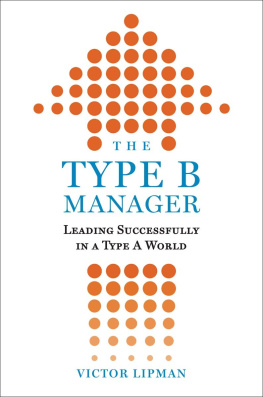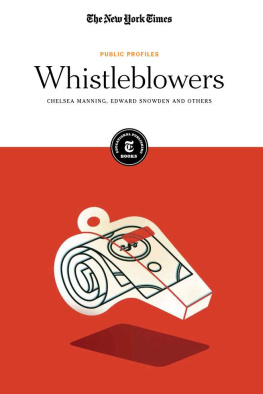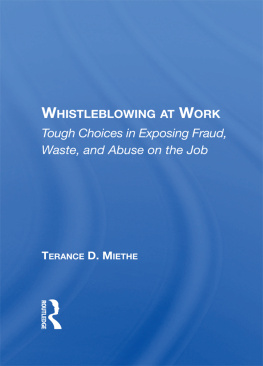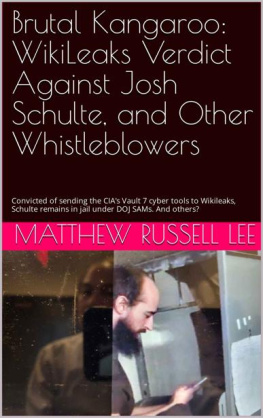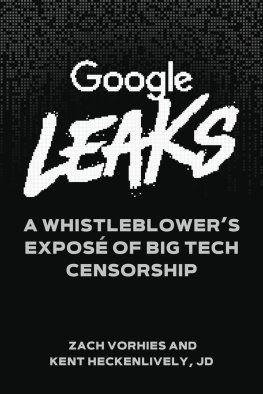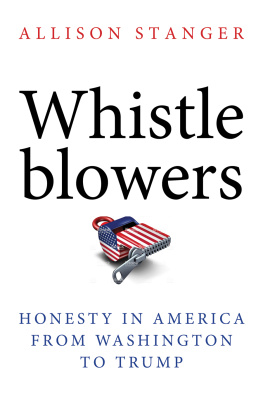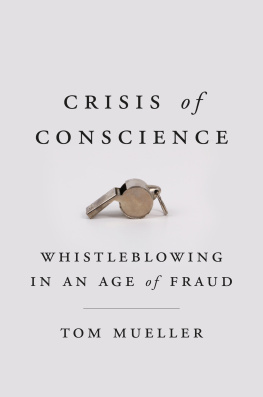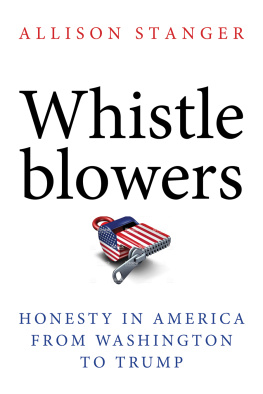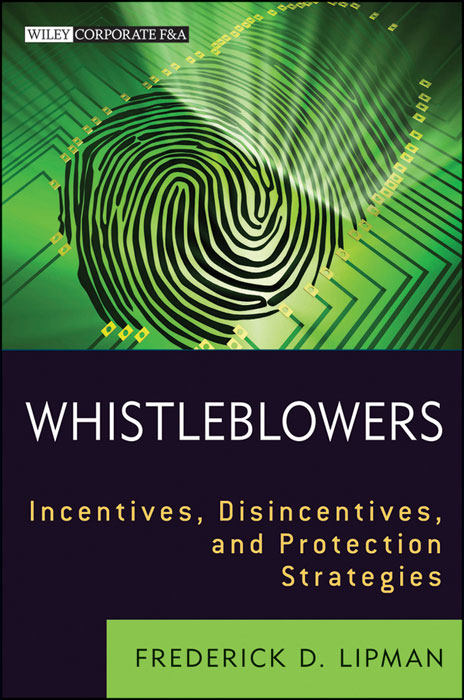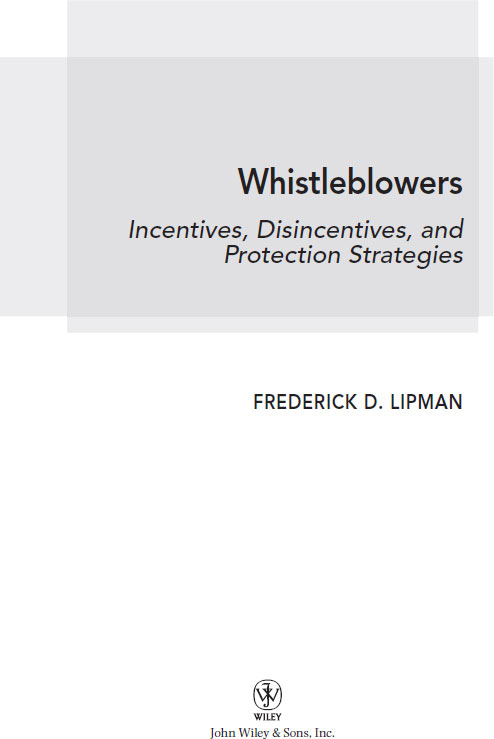Founded in 1807, John Wiley & Sons is the oldest independent publishing company in the United States. With offices in North America, Europe, Asia, and Australia, Wiley is globally committed to developing and marketing print and electronic products and services for our customers' professional and personal knowledge and understanding.
The Wiley Corporate F&A series provides information, tools, and insights to corporate professionals responsible for issues affecting the profitability of their companies, from accounting and finance to internal controls and performance management.
Copyright 2012 by Frederick D. Lipman. All rights reserved.
Published by John Wiley & Sons, Inc., Hoboken, New Jersey.
Published simultaneously in Canada.
No part of this publication may be reproduced, stored in a retrieval system, or transmitted in any form or by any means, electronic, mechanical, photocopying, recording, scanning, or otherwise, except as permitted under Section 107 or 108 of the 1976 United States Copyright Act, without either the prior written permission of the Publisher, or authorization through payment of the appropriate per-copy fee to the Copyright Clearance Center, Inc., 222 Rosewood Drive, Danvers, MA 01923, (978) 750-8400, fax (978) 646-8600, or on the Web at www.copyright.com . Requests to the Publisher for permission should be addressed to the Permissions Department, John Wiley & Sons, Inc., 111 River Street, Hoboken, NJ 07030, (201) 748-6011, fax (201) 748-6008, or online at http://www.wiley.com/go/permissions .
Limit of Liability/Disclaimer of Warranty: While the publisher and author have used their best efforts in preparing this book, they make no representations or warranties with respect to the accuracy or completeness of the contents of this book and specifically disclaim any implied warranties of merchantability or fitness for a particular purpose. No warranty may be created or extended by sales representatives or written sales materials. The advice and strategies contained herein may not be suitable for your situation. You should consult with a professional where appropriate. Neither the publisher nor author shall be liable for any loss of profit or any other commercial damages, including but not limited to special, incidental, consequential, or other damages.
For general information on our other products and services or for technical support, please contact our Customer Care Department within the United States at (800) 762-2974, outside the United States at (317) 572-3993 or fax (317) 572-4002.
Wiley also publishes its books in a variety of electronic formats. Some content that appears in print may not be available in electronic books. For more information about Wiley products, visit our web site at www.wiley.com .
Library of Congress Cataloging-in-Publication Data:
Lipman, Frederick D.
Whistleblowers : incentives, disincentives, and protection strategies / Frederick D. Lipman.
p. cm. (Wiley corporate F&A series)
Includes index.
ISBN 978-1-118-09403-7 (hardback); ISBN 978-1-118-16848-6 (ebk);
ISBN 978-1-118-16857-8 (ebk); ISBN 978-1-118-16858-5 (ebk)
1. Whistle blowingUnited States. 2. Business ethicsUnited States. 3. Whistle blowingLaw and legislationUnited States. 4. Whistle blowing Case studies. I. Title.
HD60.5.U5L57 2012
344.73012598dc23
2011029141
To my grandchildren, Tyler Keith Lipman and Jordan Sienna Lipman
Other Works by Frederick D. Lipman
The Family Business Guide: Everything You Need to Know to Manage Your Business from Legal Planning to Business Strategies
International and U.S. IPO Planning: A Business Strategy Guide
Executive Compensation Best Practices
Corporate Governance Best Practices: Strategies for Public, Private, and Not-for-Profit Organizations
Valuing Your Business: Strategies to Maximize the Sale Price
Audit Committees
The Complete Guide to Employee Stock Options
The Complete Guide to Valuing and Selling Your Business
The Complete Going Public Handbook
Financing Your Business with Venture Capital
How Much Is Your Business Worth?
Going Public
Venture Capital and Junk Bond Financing
Foreword
by Dr. Gaytri D. Kachroo, Esq.
A FEW YEARS AGO, the term whistleblower called to mind odd and sporadic anecdotes about one or two courageous individuals who dared confront and expose wrongdoing within political and corporate halls. However, two events over the last few years have overhauled whistleblowing into an industry, capable of diverse creative frameworks and modeling of the kind I am engaged in with my plethora of whistleblowing clients and incentivized by a burgeoning regulation encouraging reform and a new form of internal audit that is discussed in detail in the pages you are about to turn. These two events are the exposure of the Madoff fraud by Harry Markopolos and Julian Assange's WikiLeaks. Markopolos's testimony before the House Finance Committee in large part fueled the new whistleblower legislation, part of the Dodd-Frank Reform Act, analyzed in this book, and WikiLeaks is touted by many to have catalyzed the popular political uprisings throughout the Middle East. Each event marks major changes in the global transition to greater transparency and accountability of financial and political institutions.
When Madoff gave up his immense fraudulent endeavor on December 11, 2008, he sealed not only his own fate but also that of Harry Markopolos, the shadow that had chased him for almost a decade alongside his stellar team of fraud fighting detectives, Frank Casey, Neil Chelo, and Michael Ocrant, and persisted in blowing the whistle about Madoff to the U.S. Securities and Exchange Commission. I was privileged to join that team in 2005 as the attorney for Harry's new business, when he decided that fraud fighting through whistleblowers would become his life's work. It is therefore fitting and a great honor to introduce this text by Fred Lipman to the world, as it becomes clearer than ever before that rules and regulations relating to whistleblowing are changing, becoming ever-pervasive and affecting a multitude of industries. Without doubt, there is an added need to consult texts that simply and clearly explicate these reforms and also the background for these changes.
Fred Lipman in this text claims that had the independent directors of Enron, WorldCom, and Lehman established a robust whistleblower mechanism... they might have been able to obtain the information necessary to prevent these scandals. (See Chapter 7.) Too often, senior management and boards in public and private companies insulate themselves from information to their own detriment. In addition to the risks and exposure to shock, scandal, illegal activity, and the liability inherent in such endeavors underscored by Lipman, these directors may find corporate misdealing exposed on sites such as WikiLeaks now, if greater internal transparency and compliance measures supporting whistleblowers are not adopted.
Step by step, as a wise and learned guide, Mr. Lipman takes us through the legislation and institutional frameworks allowing whistleblowers a voice. He asserts and attempts to change the current notion in corporate boardrooms that the whistleblower is the company's enemy and not a best friend. In his systematic approach, Mr. Lipman demonstrates the possibility of an aligned company policy to reward and successfully protect corporate interests through public and private schemes incentivizing whistleblowers. He highlights the large penalties paid by such pharmaceutical companies as GlaxoSmithKline to the U.S. government on the basis of a whistleblower complaint triggered to protect the public. He also summarizes, in an easy-to-read fashion for attorneys, corporate compliance officers, and whistleblowers alike, whistleblower protections, incentives, and complaint submission procedures of the Dodd-Frank Reform Act of July 2010 as well as other statutes. Combining policy and regulatory analysis in this one text provides a powerful message to U.S. corporations to seriously overhaul their compliance measures and use the best practices necessary to create internal informants protected by management, who can in turn advise management of internal wrongdoing and oust perpetrators.



